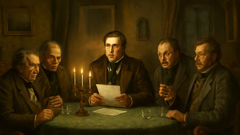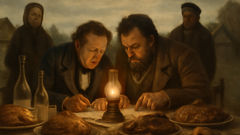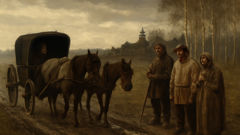Introduction
Across the vast, undulating expanse of Imperial Russia, where birch groves whispered secrets and villages crouched beneath wide, sullen skies, rumors traveled faster than the wind. In the early 1840s, on the verge of muddy spring, a carriage rolled down the rutted roads of an unremarkable province, its wheels splattering slush on the faded coats of roadside peasants. The carriage belonged to a man whose name would soon be on everyone’s lips—from dour town clerks to the drunken nobility and gossipy servants: Chichikov. Polite, portly, mysterious, and impeccably dressed in a tailored frock coat, Chichikov was the sort of visitor who arrived with the rain, vanished with the fog, and left confusion in his wake.
No one could quite place him. He was neither a government inspector nor a tax collector, and yet he bore himself with the gravitas of both. Letters of introduction smoothed his way into manor houses large and small. His conversation sparkled just enough to flatter, never to outshine, and he seemed to possess an uncanny memory for family trees and ancestral scandals. But it wasn’t Chichikov’s manners or his carriage that set provincial society ablaze—it was his peculiar business. He sought to buy serfs, but not living souls. Instead, he wanted the paperwork for peasants who had died since the last census, souls who lingered only in ledgers and lists, weighing down a landlord’s tax bill.
The notion was so odd, so fantastical, that it wormed into every fireside chat and churchyard gathering. Was Chichikov mad, or a genius? Was there a secret fortune to be made in dead souls? Landowners, strapped for cash and desperate for relief from government levies, were quick to listen. Yet as Chichikov’s shadow fell over the countryside, he revealed more than just the foibles of the landowning class—he exposed the tangled roots of pride, ambition, and despair that held rural Russia captive.
This is the story of Chichikov’s passage through a land suspended between feudal tradition and modern appetite, where the value of a man might be measured by the weight of names written in ink, and where the boundary between the living and the dead was not always as clear as it seemed.
The Strange Visitor: Chichikov in N Town
N Town wasn’t the sort of place to appear in travel journals. Its central square was paved in a patchwork of ancient cobblestones, rutted from generations of merchant carts. On market days, the air swelled with the mingled smells of fresh bread, stale tobacco, and horse sweat. The great men of N Town—the governor, the chief of police, the land surveyor—met each morning at the club, where they drank strong tea, gossiped about Petersburg fashions, and nursed old rivalries over games of whist. Into this comfortable routine burst Chichikov.

He arrived not with fanfare but with a series of small, deliberate gestures: a generous tip to the innkeeper, a donation to the church roof fund, and a cordial visit to the governor’s wife, bearing sweets wrapped in crinkling paper from Moscow. His flattery was effortless; he listened more than he spoke, never pressing but always prompting, and soon invitations to dinner and soirées flowed his way. The town’s elite found themselves drawn to his conversation, his sly wit, his surprising depth of knowledge about the intricate machinery of Russian bureaucracy.
Behind the scenes, Chichikov inquired about estates and taxes. He commiserated with the governor over the latest imperial decrees, and with the mayor about shortages of lamp oil and paper. The question he posed, however, was always the same: did the landowners of N Town keep their census records in order? How many serfs had passed since the last audit, and how burdensome were the associated taxes? In a land where the dead remained on the books until the next state review, every deceased peasant was a cost—unproductive, uncollectable, yet taxable. Chichikov’s solution was radical. For a modest sum, he offered to purchase these ‘dead souls,’ removing them from the ledgers and sparing their owners further expense.
At first, the proposal was met with confusion and suspicion. Madame Korobochka, a widow with more worries than livestock, thought Chichikov was mad or perhaps a recruiter for some government scheme. The blustering landowner Sobakevich invited Chichikov to inspect his ‘souls’ over a dinner of roast goose and vodka, insisting that even his dead peasants were sturdy, well-behaved, and worth a premium. The extravagant Nozdryov tried to barter, tossing in a pair of broken hunting dogs and a moldy barrel of Madeira with every transaction.
As Chichikov’s collection of ‘souls’ grew, so did the town’s curiosity. What possible profit could there be in acquiring names that belonged to the grave? Some whispered that Chichikov was building an army of phantoms to seize an inheritance or win a government contract. Others believed he was simply a fool, destined to be fleeced by sharper minds. Only a handful, like the introspective landowner Plyushkin—whose estate was a graveyard of decaying barns and forgotten tools—recognized something familiar in Chichikov’s desperate arithmetic: the endless search for value where none was left, the stubborn refusal to let go.
Chichikov’s journey through N Town soon became more than a commercial venture. He dined in candlelit halls heavy with portraits of stern ancestors and visited peasant huts where sorrow clung to the air like winter frost. With every deal struck and every ledger amended, he glimpsed the contradictions at the heart of Russian society—the hunger for progress yoked to ancient burdens, the pride that disguised poverty, the loneliness at the root of ambition. But Chichikov, for all his charm and calculation, carried secrets of his own. The nature of his business, and the true cost of his commerce, would only become clear as he pressed deeper into the countryside.
Bartering for Shadows: The Art of the Deal
The countryside surrounding N Town sprawled for miles in every direction, a patchwork of fields, forests, and sleepy villages ruled by old families who clung to their traditions with the same tenacity as they did to their titles. For Chichikov, each estate visit began with a careful calculation: a gift for the lady of the house, a compliment for the master, and a practiced patience for the labyrinth of hospitality rituals.

On Madame Korobochka’s estate, Chichikov was welcomed into a parlor that smelled of mold and boiled cabbage. The widow, bundled in layers of faded shawls, eyed him with suspicion as he explained his proposition. "Buy my dead souls? Why would you want them?" she asked, her gnarled hands twisting her apron. Chichikov smiled gently, explaining that it was a matter of paperwork—a favor to both parties. She hesitated, torn between fear of being cheated and hope for a few extra rubles. In the end, she agreed, but only after consulting a neighbor, her housemaid, and the village priest.
At Sobakevich’s manor, things were different. The landowner—a man with a head like a boulder and fists to match—insisted on a grand meal before any business could be discussed. The table groaned under the weight of roasted meats, pickled vegetables, and bottomless bottles of spirits. Sobakevich boasted about the virtues of his deceased peasants, recounting tales of their strength and loyalty as if they were still alive. "Even my dead ones are better than Nozdryov’s living rabble!" he declared, thumping the table for emphasis. The negotiations were loud and theatrical, filled with haggling over every name, but Sobakevich’s pride was tempered by pragmatism: every soul sold was a tax burden lifted.
Nozdryov’s estate was a study in chaos. Dogs barked, chickens darted underfoot, and the master himself appeared half-drunk before noon. Nozdryov treated the whole affair as a game, offering absurd trades—a soul for a broken samovar, another for a dented French horn. Chichikov navigated the madness with a polite smile, noting each transaction in his leather-bound ledger while declining offers to join impromptu card games or hunting expeditions.
Plyushkin’s estate was the most dismal of all. Once grand, it had fallen into ruin; barns collapsed under their own weight, fields lay fallow, and outbuildings teetered on the edge of collapse. Plyushkin himself shuffled through the debris like a ghost, clutching a ring of rusty keys. His peasant lists were long and sorrowful, the names of entire families who had died in poverty or wandered away in search of bread. He sold his dead souls for pennies, more eager to be rid of them than to profit. In his eyes, Chichikov glimpsed something like recognition—a fellow scavenger haunted by what he could never reclaim.
Through these encounters, Chichikov learned that every transaction was an act of theater. Landowners paraded their eccentricities, each deal a performance shaped by pride, desperation, or simple habit. Yet behind every bargain lurked the same question: What was the true value of a human life reduced to a line in a ledger? As Chichikov’s portfolio of dead souls expanded, so did his reputation. Some envied his ingenuity; others feared his motives. The countryside buzzed with speculation. Was Chichikov an agent of the state, a swindler, or something stranger still—a man trying to buy his way back to the living?
Yet Chichikov pressed on, driven by reasons he kept hidden even from himself. Each new signature brought him closer to a reckoning—not just with the authorities, but with his own conscience.
Conclusion
Chichikov’s journey through the Russian provinces left a mark that lingered long after his carriage disappeared into the morning mist. The town gossips would whisper about him for years—was he a rogue, a prophet, or merely a mirror held up to the face of a decaying society? He had traded in dead souls, but the living remained ensnared by their own burdens: the pride that turned poverty into theater, the desperation that made men barter ghosts for kopecks, and the loneliness that haunted even the grandest estates. For all his cunning, Chichikov was as much a victim of illusion as those he dealt with—a man seeking redemption in the shifting shadows between life and death.
The ledgers were tidied, the taxes eased, but nothing truly changed. The landowners remained tethered to their vanished serfs by invisible chains of habit and memory, while Chichikov rode on, haunted by the weight of all he had gained and all he had lost. In the end, the story of the dead souls was not simply about fraud or ambition—it was a portrait of a society trapped between eras, searching for meaning in names, in numbers, in fleeting bargains. Perhaps, in that endless journey across muddy roads and faded drawing rooms, Chichikov glimpsed the truth that eluded so many: that redemption lies not in what we acquire or record, but in what we are willing to let go.













